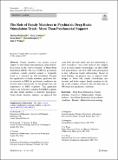| dc.contributor.author | Boulicault, Marion | |
| dc.contributor.author | Goering, Sara | |
| dc.contributor.author | Klein, Eran | |
| dc.contributor.author | Dougherty, Darin | |
| dc.contributor.author | Widge, Alik S. | |
| dc.date.accessioned | 2023-05-30T13:47:27Z | |
| dc.date.available | 2023-05-30T13:47:27Z | |
| dc.date.issued | 2023-05-26 | |
| dc.identifier.uri | https://hdl.handle.net/1721.1/150824 | |
| dc.description.abstract | Abstract
Family members can provide crucial support to individuals participating in clinical trials. In research on the “newest frontier” of Deep Brain Stimulation (DBS)—the use of DBS for psychiatric conditions—family member support is frequently listed as a criterion for trial enrollment. Despite the significance of family members, qualitative ethics research on DBS for psychiatric conditions has focused almost exclusively on the perspectives and experiences of DBS recipients. This qualitative study is one of the first to include both DBS recipients and their family members as interview participants. Using dyadic thematic analysis—an approach that takes both the individuals and the relationship as units of analyses—this study analyzes the complex ways in which family relationships can affect DBS trial participation, and how DBS trial participation in turn influences family relationships. Based on these findings, we propose ways to improve study designs to better take family relationships into account, and better support family members in taking on the complex, essential roles that they play in DBS trials for psychiatric conditions. | en_US |
| dc.publisher | Springer Netherlands | en_US |
| dc.relation.isversionof | https://doi.org/10.1007/s12152-023-09520-7 | en_US |
| dc.rights | Creative Commons Attribution | en_US |
| dc.rights.uri | http://creativecommons.org/licenses/by/4.0/ | en_US |
| dc.source | Springer Netherlands | en_US |
| dc.title | The Role of Family Members in Psychiatric Deep Brain Stimulation Trials: More Than Psychosocial Support | en_US |
| dc.type | Article | en_US |
| dc.identifier.citation | Neuroethics. 2023 May 26;16(2):14 | en_US |
| dc.contributor.department | Massachusetts Institute of Technology. Department of Brain and Cognitive Sciences | |
| dc.identifier.mitlicense | PUBLISHER_CC | |
| dc.eprint.version | Final published version | en_US |
| dc.type.uri | http://purl.org/eprint/type/JournalArticle | en_US |
| eprint.status | http://purl.org/eprint/status/PeerReviewed | en_US |
| dc.date.updated | 2023-05-28T03:14:16Z | |
| dc.language.rfc3066 | en | |
| dc.rights.holder | The Author(s) | |
| dspace.embargo.terms | N | |
| dspace.date.submission | 2023-05-28T03:14:16Z | |
| mit.license | PUBLISHER_CC | |
| mit.metadata.status | Authority Work and Publication Information Needed | en_US |
